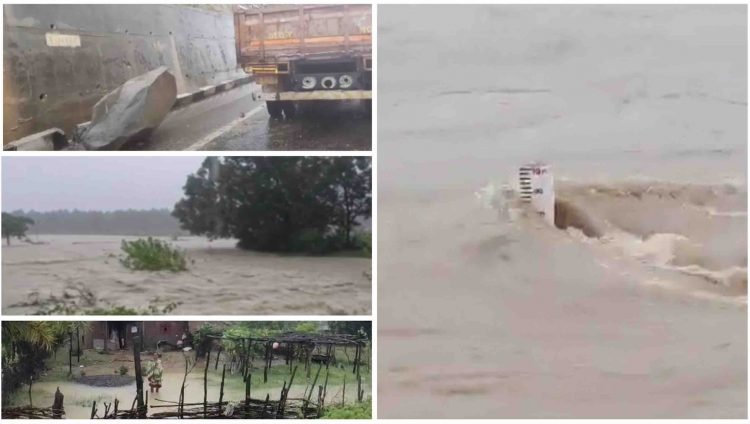Bansadhara water level crosses danger mark in Gajapati
Following heavy rains in Odisha and the upper catchment areas of the rivers over the previous two days, the Bansadhara and Baitarani rivers breached the danger mark on Wednesday.

Bhubaneswar: Following heavy rains in Odisha and the upper catchment areas of the rivers over the previous two days, the Bansadhara and Baitarani rivers breached the danger mark on Wednesday.
According to sources, the Bansadhara is flowing at 54.90 meters per second, compared to the danger level of 54.60 meters per second near Kashinagar in Gajapati district. The district administration has issued a warning to residents to be on the lookout for flooding in low-lying areas. The administration is also keeping a close eye on the situation in neighboring Andhra Pradesh, which released the first floodwaters of the season through the Gotta barrage's 17 gates in Srikakulam.
Similarly, the water level in the Baitarani is rising as a result of the continuous rainfall. The river has passed the danger mark at Rajghat, where it is flowing at 39.14 meters per second, compared to the danger mark of 36.36 meters per second. At 12.35 p.m., the river's water level was 17.83 meters above the danger level in Akhuapada.
Heavy rainfall caused by the depression has also resulted in flood-like conditions in several parts of the state. While floodwaters inundated many low-lying villages in Sonepur district's Biramaharajpur, Manisapali, Manisapali Jungle, Brahmanipalli, Baraghat, and Krushnapalli villages are stranded following the release of floodwaters from Harihara Jore dam on Tuesday night.
With floodwater flowing five feet above the road, communication between Biramaharajpur and Luturapanka, Bahalapadara, and Durjanatalai panchayats via the Amrapalli route has also been disrupted.
A landslide was also reported at Judiya ghat hills on the Kolkata-Mumbai National Highway-49 (NH-49) in the district, leading to disruption in communication. Residents of Jamuhata, Sponge colony and Dhangarapada are also stranded due to the excess water because of heavy rains.
Additionally, communication links between Telkoi and other major areas like Talcher, Dhenkanal, Cuttack, and Bhubaneswar have been snapped due to the deluge. The Hanumantia Nuallah bridge is also submerged under water, leading to breakdown of communication between Telkoi, Rourkela, and Sambalpur, the sources added.
Meanwhile, Special Relief Commissioner (SRC) Satyabrata Sahu on Wednesday reviewed the rain situation with the collectors of Angul, Balasore, Bargarh, Boudh, Bhadrak, Balangir, Dhenkanal, Gajapati, Jajpur, Jharsuguda, Kandhamal, Keonjhar, Kalahandi, Mayurbhanj, Nuapada, Sonepur and Sambalpur. They have been directed to take adequate precautionary measures and keep all field-level functionaries at strategic locations susceptible to waterlogging/low-lying areas to meet any eventuality. “People from waterlogging areas are to be evacuated if required and sheltered in safe shelters. They shall be provided with dry/cooked food and drinking water. Adequate Anti-Snake Venom must be available in DHH/CHCs/PHCs. The local Fire Service Teams & ULB authorities shall take steps in de-watering and clearance of uprooted trees if arises. Vehicular traffic must be regulated carefully on submerged roads,” the SRC said.
He further said that Collectors may decide close schools and Anganwadi centres if required due to heavy rain. Vehicular traffic must be regulated carefully on submerged roads, he added.
Notably, highest rainfall of 390.6 mm was recorded in Boudh block of Boudh district in the last 24 hours. Twenty places reported extremely heavy rainfall (>20.4cm) , 50 very heavy rainfall (11.6 to 20.4 cm) and 61 stations heavy rainfall (6.5 to 11.5 cm). More than 300 mm rainfall was recorded in Boudh (390.6 mm), Karanjia in Mayurbjanh (300.6 mm) and Jujumura (361.8 mm) and Rairakhol (348 mm) in Sambalpur district.
Similarly, more than 200 mm was recorded in 17 blocks — Athamalik- 232.0 mm & Kishorenagar- 230.0 mm of Angul district; Duduka- 223.4 mm of Balangir district; Phiringia- 219.2 mm, Baliguda- 210.0 mm, Nuagaon- 206.4 mm & Phulbani- 205.6 mm of Kandhamal district; Saharpada- 276.8 mm & Patna- 220.2 mm of Keonjhar district; Thakurmunda- 218.0 mm, Joshipur- 217.2 mm, Raruana- 210.0 mm & Sukuruli- 208.6 mm of Mayurbhanj district; Birmaharajpur- 272.4 mm, Ullunda- 262.0 mm, Binika- 227.2 mm & Dunguripali- 210.0 mm of Sonepur district.
The India Meteorological Department has issued ‘Red Warning’ for 10 districts for the day. Heavy to very heavy rainfall (7 to 20 cm) is likely at a few places in Sundargarh, Jharsuguda, Bargarh, Balangir, Sonepur, Sambalpur, Deogarh, Angul, Keonjhar, and Boudh with isolated extremely heavy rainfalls (>20cm) in Sundargarh, Jharsuguda, Bargarh, Balangir, Sonepur, and Sambalpur.





 user1
user1 









